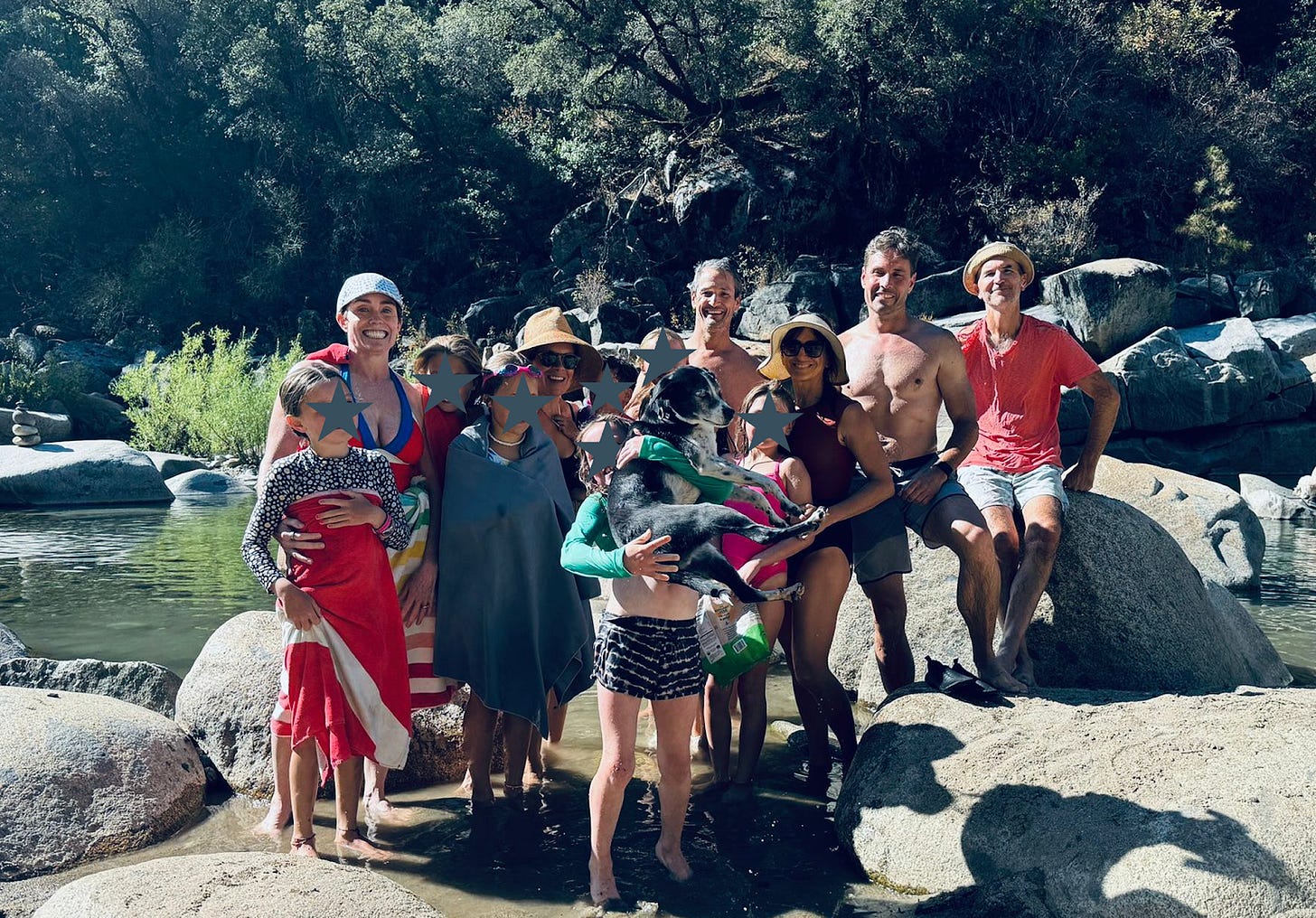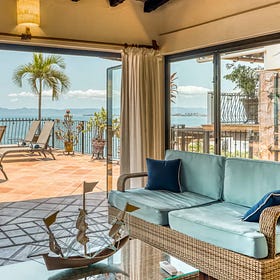How (and why) to do pop-up communes
And why they are especially great for families
Note from the editors: this is a guest post from Chloe Sladden, co-founder of Honeycomb and author of The Family Commons. While most parenting advice focuses on what you should do differently, Chloe focuses on who should be doing it with you. Through her work with communities nationwide, Chloe helps parents shift from isolated, intensive parenting to collaborative caregiving that increases well-being and trust.
I’m the kind of person who fantasizes about living with a bunch of my closest friends in one big village with everyone raising kids together. But like a lot of people who dream about something like this, so far I haven’t managed to make it happen. I have a mortgage, my partner is an introvert, and the friends I’d want to do it with aren’t logistically aligned enough to make it happen right now.
Every now and then, we talk about moving to New Zealand––where my family is originally from––once our kids are in high school. Maybe we’ll manage to pull it off. But in the meantime, we’ve found something else: pop-up communes.
Pop-up communes are just the thing for people who love the idea of coliving but can’t make it happen full-time. They’re also a great way to test the idea of coliving before committing to anything bigger. But most importantly, they root me in what matters most: shared meals, honest conversation, and the deep belonging that comes from being with a circle of friends who feel like family.
Wait, what’s a pop-up commune?
It’s a weekend where 2-3 families live together under one roof. Kids pile onto floors and mattresses, grown-ups cook, clean, and stay up too late talking about life. It’s messy and joyful and surprisingly doable.
When my three girls were little, we’d sometimes share Tahoe rental houses with friends. But we started doing pop-up communes in earnest when we moved from San Francisco to Bolinas. I worried we’d lose touch with our city friends, but when they started visiting us for weekends, the opposite happened: we started making huge leaps in connection with the families who stayed with us.
Now we do pop-up communes 3-5 times a year with a rotating group of families. Sometimes we host; other times we rent a place together. Every time, it fills my cup like nothing else. They can last from a long weekend to a few weeks and typically involve 2-4 families. We’ve done Airbnbs, camper vans, and even wilderness huts with 25 other hikers. Over the past year, we’ve done pop-up communes in Sonoma, the Yuba River, Watsonville and even New Zealand, as well as hosted several at our house in Bolinas.
How to pop-up commune
A pop-up isn’t quite a vacation, and it’s not traditional “hosting” either. It’s like regular life—but easier, because you’re not doing it alone. When everyone shares the load of cooking, cleaning, and childcare, it feels like a break for all involved.
Here’s how to make it work:
Step one: pick an instigator
Pop-up communes don’t happen by accident. Someone needs to propose the idea, coordinate participants, pick a date, etc. If you’re reading this, that person is probably you.
Don’t assume your group isn’t worthy of pop-up communes just because it hasn’t happened yet. These things don’t organize themselves. Step into the instigator role and own it.
Step two: choose your people
Start small, with one or two other families. Start inviting them over for meals. Having dinner with someone tells you a lot about how you’ll get along over a whole weekend. Do they offer to help clean up? Are your parenting styles more or less aligned? Do your conversations go well beyond small talk?
If dinners feel good, try a weekend away together. If you’re both planning to travel for a long weekend, why not go together? Framing it that way can feel more comfortable than jumping in right away with “Hey, want to live with me for a weekend?”
Step three: get it on the calendar
I kick off the planning by asking my friends about possible dates, a few months or up to a year in advance. If people are non-committal, I just send a calendar invite: “Hold for pop-up commune in Bolinas.” Even if we end up changing the date, it helps create momentum.
You don’t need a whole week. Three-day weekends are ideal, but you can pull it off on a regular weekend too. The more casual and low-lift it feels, the more likely you are to do it regularly. 1-2 nights is a perfect amount of time.
If it goes well, build up to a stretch goal: a week together in the summer. Avoid the logistical nightmare of summer camp by having each adult take a day to be on point with the kids while the others work –– or take it as holiday! Soon you’ll wonder why you ever planned holidays without another family.
Step four: pick a venue
There are two basic pop-up commune formats: host at home or rent a place together. I do a mix of both.
Hosting at home is the simplest and cheapest. You can do it any time with minimal planning/expense. Don’t let space hold you back—my house is 1,200 square feet. As long as each couple has a bedroom and the kids can pile on the floor (or in a tent outside if it’s warm enough!), you’re golden. “Kids in a pile on the floor” is basically the official aesthetic of pop-up communes.
Airbnbs work too, and it can be magical to feel like you’re building something new together for the weekend. If you can afford it, go ahead and book something big even before you have firm commitments. If someone bails, you can invite someone else. You don’t have to wait for consensus, and the spontaneity adds to the fun.
I book at least 2-3 large Airbnbs per year (refundable if possible, and with travel insurance if they are on the more pricey side), throw them into my friends’ calendars up to 12 months in advance, and then start nudging them a few months before. I often have to give a deadline (“I need to know if you guys are in by this Friday, so I can invite other folks if not! If I don’t hear from you, I’m assuming it’s a no.”) Yes, even these amazingly high-quality people who I love and adore, and trust with my children’s lives, need to be nagged about commitments. I have a back-up plan to ensure the weekend will be full: sometimes it’s other families I want to get closer to (an invite only a few weeks before can feel lighter than a long-planned date “we have an extra bedroom in our Airbnb next weekend, want to join us?”), my brother’s family, or the in-laws.
Step five: lightly coordinate (i.e. “host without hosting”)
A golden rule: no one person is on point for all the meals. Even if you are being hosted in someone’s home, actively and aggressively take responsibilities off their plate. A few days before, start a text thread and suggest a couple of meal ideas. (“How about a BBQ on Saturday? I can make burgers” or “I have a bean stew in the freezer I’d love to contribute. I can make cornbread to go with it. Can someone take on a salad?”). I like to do most of the food prep together. It can be casual (a text thread), or type A (a spreadsheet that also tracks allergies, intolerances and even snacks).
If it’s your first time planning a pop-up with another family, you might want to talk ahead of time about expectations, especially around parenting stuff and household labor. For example, I am usually way more relaxed about letting the kids watch movies during pop-up communes—it helps everyone chill out. But we also change it up (we had a zero screen day at our last one). But the point is, not everyone feels the same way about these topics, so it’s good to get on the same page ahead of time. I love prompts for these conversations—check out the list I made below with my pop-up commune families. But if that’s not your style, you can just have a casual conversation (or just wing it!).
Step six: commune!
There are only three rules I swear by:
Make cooking a key ritual. Being creative together and nourishing each other’s families is one of the great pleasures in life.
If you’re a guest, try to wash and change your sheets before you leave.
Before the weekend ends, pick a date for the next one—even if it’s just a placeholder.
At a time when parenting has become increasingly hard and isolating, families need small wins and meaningful ways to connect and lessen the parenting load. Pop-up communes are exactly that—a perfect small win that fills your tank while building the foundation for bigger community changes.
Bonus: Things to discuss with your pop-up commune families
How do we get things done?
Options: we all do this together; just the moms or just the dads; a few of us; just the host (if there is one)
Sharing meal planning and cooking
Sharing cleaning up after meals, including unloading the dishwasher
Grocery runs
What is our end-of-weekend cleanup ritual, e.g. stripping sheets and helping get bedding/towels laundry going?
Taking the kids on an adventure / to the park
How do we best parent together?
How much screen time should the kids get? Do we use our normal rules, or special pop-up rules?
If kids don't get along, how do we handle it? Some options: let them work it out, give them a break from each other, get involved and help them come up with a plan
Do kids eat with adults? Do we have dedicated adult dinner time?
Shared childcare agreements: “all our kids are our kids”. Can we discipline each other’s children as if they were our own? Can we hug and touch them as if they were our own?
What is our expectation of older kids helping with younger kids? E.g. is mixed age play encouraged and expected?
Editor note: Chloe notes that in her experience pop-up communes work best for kids over the age of 4 .. but also that they’ve tried it at all ages.
In her words: “There is always kid drama, and maybe we should call that out more. Which kids gets to sleep with which kids and in which room and beds? Who's feeling left out? There is often a fight, and tears. But I relish these moments (when I'm not utterly annoyed by them) because we get to do active parenting together — and I don't have to figure it out myself (like so much of school friendship conflict when it's reported after the fact, and you are trying to coach for the next time); I have other parents to troubleshoot and debrief with.”
How do we take care of each other?
What downtime does your family need? Who are the introverts, and how can we build in restorative time for them?
What topics do we want to talk about? Not talk about? Any seeds to plant?
Suggested further reading
A low-risk way to see if coliving is right for you
Once upon a time, cities were vibrant places to learn, work, play, and meet Tinder dates.
Building a home wherever I roam
Note from the editors: this is a guest post from Emily Ann Hill, author of Extracurricular Pursuits, a newsletter that intertwines her adventures in full-time travel with her quest for intentional living. With the rise of remote work, there’s been an explosion of ephemeral communities like Emily describes here. As we wrote in our post on








Love this! So inspiring. Such a sweet way to make special occasions and memories of community with kids.